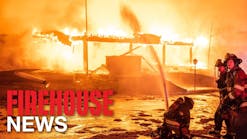WASHINGTON-- Funding, government policies and interoperability were hot topics at the Congressional Fire Services Institute's 19th Annual National Fire and Emergency Services Seminars, Thursday, March 29.
The event initially kicked off the previous day with a variety of seminars on general fire service topics presented at the Hilton Washington, which also is the site of annual dinner (coverage of the dinner will be posted on Firehouse.com the morning of March 30).
Thursday's seminars focused on congressional issues affecting the fire services and included members of the Congressional Fire Caucus as well as officials from FEMA, the USFA, NFFF and the IAFF.
Funding the Fire Service
On the same day the Department of Homeland Security began accepting applications for the 2007 Assistance for Firefighter Grant Program, many guests in attendance discussed the importance of grants to the fire service.
Andy Mitchell, Director of Operations of the DHS Office of Grants & Training, noted that a big change for the AFG grants this year is that departments are allowed to apply for more than one program. A separate application will need to be submitted and multiple applications from a single department will be reviewed separately.
"We believe this will allow departments to get a better understanding of the program in its entirety," he said.
The legislation for the FIRE ACT grants -- which AFG is a part of -- was passed in 2000. Since that time, Congressman Bill Pascrell Jr. (D - NJ), a member of the Fire Caucus, said that close to $3 billion in grants have been issued to U.S. departments.
Pascrell, a co-author of the Fire Act, said that he believes through a newly elected congress, the outlook for fire service grants is positive. "We have a better opportunity to make sure the SAFER Bill becomes what it was supposed to become, because we know that many of the departments across the U.S. lack the needed equipment and personnel," he said.
"The President tried to zero out these programs, but enough Democrats and Republicans stood up and said, 'No way, Jose.' "
Several of the government officials in attendance pointed out the shortcomings of the funding programs, offering ways to insure that both urban and rural departments get the resources that are needed.
Daniel Kaniewski, a member of the Homeland Security Council and a former volunteer firefighter, believes that more attention needs to be spent on issues on the state level.
"We've been focusing too much on the federal level and need to focus more on the local and state levels," he said. "Over 99 percent of the incidents each day are handled at the local level."
Office of Management and Budget official Michael Bopp said problems sometimes arise when DHS money is given directly to states to distribute to local departments. According to Bopp, only one-third of DHS grant money distributed to states finds it way to the departments.
"Part of the problem is when money goes to the state in a big chunk and they are aware the departments get money from other sources," he said. "Sometimes the mentality is that the departments are already taken care of."
Shaping DHS Policies
As the Department of Homeland Security continues to take form, so do its policies. Kaniewski said one of the department's main goals is to change the National Response Plan to a clearly defined and easily understood program.
Currently the plan is littered with acronyms include NIMS (National Incident Management System), ICS (Incident Command System), UASI (Urban Areas Security Initiative) and NRP, which stands for the program itself.
"I have a hard time remembering all of the acronyms myself," he said. "(The plan) needs to be understood by all firefighters."
Josh Dozer, also of the Homeland Security Council, stressed the importance of the policies and their relationship to funding and grant money.
"It is more than just money, more than just grants," he said, noting that before 9/11, preparedness policies were pretty straightforward, but have since required much more resources and coordination.
"We can't just throw money around; we can't just throw it at the problem," he said. "We need to get the biggest bang for our buck."
Dozer said a major goal of DHS is to establish metrics by which preparedness can be measured. He also spoke of the different needs of various departments and acknowledged that "one size indeed does not fit all. Not everyone needs 50 SWAT teams and the federal government should be the last one telling you what you need."
Interoperable Communications
Another key component of the day's discussions centered on the importance of interoperable -- or streamlined -- communications.
The government has allocated $1 billion for interoperable communications in order to help prevent issues that arose during Hurricane Katrina when different agencies were unable to communicate with each other.
Pascrell questioned the current state of communications in regards to Katrina: "Will we be thrown in into the inferno where we can not communicate with each other?"
"We've faced this for decades," Mitchell said. "It's frustrating for us and I'm sure it's frustrating for you. The main question is 'how can we make it work without you needing to buy a new radio system.' "
Congressman and member of the Congressional Fire Caucus, Charlie Dent (R - PA), said that insurances have been made that the new units will be compatible with existing systems.
The Fire Service and Capitol Hill
Pascrell spoke on the importance of firefighters making their voices heard to members of congress.
"Your presence here on the Hill is critical," he said. You need to reach out and talk to every congressman you can. You have so much power in your hands and you don't even know it."
On the same day, the results of this relationship were seen first hand as fire chiefs from the National Capitol Region presented hazmat and emergency equipment on the national mall purchased through the Department of Homeland Security Urban Areas Security Initiative (UASI).





